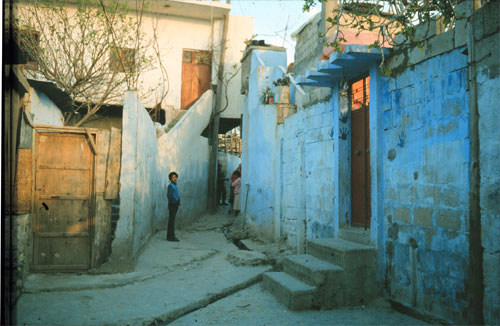
|
 |
| Photo: Leena Saraste |
| 'Suhayla', Bir 'Ona, June 2, 1998:
|
|
The home of 'Suhayla' and her husband is threatened with demolition. They live in the tiny village of Bir 'Ona, which is like an extension of Beit Jalaa, but has nonetheless its own identity and history. Suhayla and her husband were both born here, and their parents before them. Among the many photos decorating the tiny parlour is one of a man of the family wearing the uniform of the volunteer Defence Units that most Palestinian villages mobilized when communal conflict started in 1947.
Israel is swallowing Bir 'Ona bit by bit. Some years back, without informing the residents, Jerusalem Municipality re-drew the map to ingest it, cutting it out from its West Bank environment. Overnight this changed the political and legal status of Bir 'Ona's people, imposing on them payment of the heavy 'anoona' (municipal tax), though without giving them the identity and rights of Jerusalemites. Worse, the change brought more stringent regulations regarding home and property rights. A fly-over autostrada connecting Jerusalem to settlements in the West Bank had already cut across the village on one side, and when I visited 'Suhayla' another was under construction on the other. Much village land was being appropriated for these so-called 'public' routes, though Palestinian residents are not allowed to use them without a special permit. Any home deemed in the way of such 'public' construction can be condemned to demolition as 'illegal' (built without Israeli permits), even if, like Suhayla's, they were built long before Bir 'Ona became part of 'Greater Jerusalem'. Meanwhile the village's own old road to Jerusalem has been blocked. The village has no public institutions, neither school, church, mosque, or clinic - an institutional deprivation that clearly destines it for easier absorption. 'Suhayla' asks me not to use her real name because her husband wouldn't like it. He fears any kind of media exposure, and the current threat to their home makes them both doubly nervous. They also refuse to allow her photo to be taken, a lost opportunity I deeply regret since Suhayla has evidently been a beauty, and her face now wears an expression of haunting anxiety that communicates her fear of losing her home even better than her words. The photographer Leena Saraste is with me on this visit, and could have made a wonderful portrait of a woman framed in a home that has absorbed her every breath and thought. Though tiny, the house incarnates home-making passion: two small rooms in front, two small bedrooms and utility rooms in back, the whole filled with plants, photos, picture postcards, calendars. It's not just functional domestic space but an expression of existence. This is a highly educated family in spite of their poverty. Both parents finished high school - that's where they met and got engaged. Suhayla's husband was offered a scholarship to study medicine in Hungary, but ill health prevented him from accepting it. Suhayla taught for several years and is now part of a Parents' Council at a large foreign school in Beit Jalaa. One of their children recently graduated from Bethlehem University, another is in high school; |
their married daughter is a studying too.
In my travel notebook I wrote, "Suhayla is a small, thin, intense woman. Though at first she says that it's hard to record 'out of the blue', in fact as soon as she starts the dynamic of her story takes over and she expresses with great force and emotion how she and her husband worked day and night to build this house, how they sacrificed everything for it, not just money but also peace of mind." It took them twelve years of saving and scraping to build their house, and they built it with their own hands, brick by brick. Many times the children went to bed without supper, or to school without sandwiches. Tears stream down Suhayla's face when she talks about her children, and the hardships they went through. When their oldest son was three, she had a job as a teacher, so her husband used to take the child with him to his work site, and put him to sleep on cement sacks. The recording is a very emotional one for all of us. They've seen on TV how the Israelis may come, without warning, and begin destroying everything, including all personal possessions. One night recently, after a tip-off that demolition was imminent, they sat up all night, fully clothed, with ID cards ready. One can imagine what a toll such a situation may take on health and well-being, how any kind of 'normal' life - plans, relaxation, holidays - are completely ruled out by it. We leave them feeling extremely depressed. It's good to know that a number of Palestinian and Israeli human rights groups are trying to prevent home demolitions. But they are usually powerless to stop the armed forces once they have decided to act. 'Suhayla' speaks: We stayed like that, in poverty. And when I got older I did the 'towjihi' [high-school finishing examination], and we passed. I taught for a year or two. Then I married. And after marrying, I still taught for another year, then I couldn't go on. We stayed living in Bir 'Ona. We stayed for several years in rented homes. The first few years, we were in a rented house. It was very old, it was damp. It was frightening, isolated. Above it was all wild, there were no roads, no car could reach us. Once we were asleep at night. It was 1.30. We woke up and found three thieves standing over our heads and beating us....The children - I had a daughter and a son, the girl was four years old, the boy was a year and eight months - were screaming and crying...". |
[Speakers in the West Bank] [Hassan Abdel Jawad] Copyright©2005 |
|